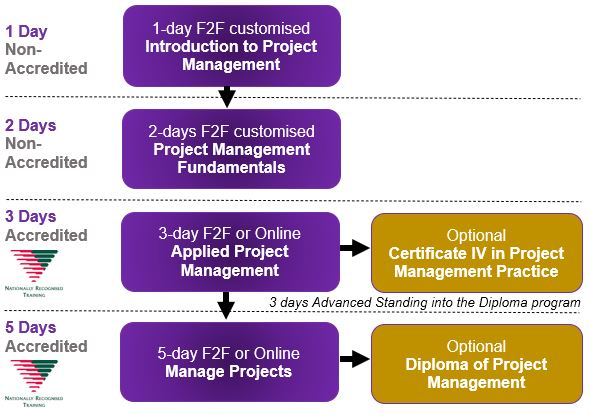Project Management

Learn directly from our internationally experienced and practicing project managers.
Our project management programs include both face-to-face and online training options.
Due to COVID19 restrictions, the Institute is only providing online or inhouse customised programs.
Face to Face Programs (Public and Customised Organisation Specific Programs)
Online Courses
- Online Applied Project Management (leads to the Cert IV in PM Practice)
- Online Manage Projects (leads to the Diploma of Project Management)

Project Management Essentials
The 1-day Project Management Fundamentals educational experience provides an intensive information-based education to work on key project areas.
The 1-day intensive Project Management Essentials course covers:
- Defining key project management terms;
- Outlining the roles of people in projects;
- Explaining the four stage Project Life Cycle;
- Explaining the five process groups;
- An overview of the 10 knowledge areas:
- scope management;
- schedule management;
- cost management;
- quality management;
- resource management;
- communications management;
- stakeholder management;
- risk management;
- procurement management; and
- integration management.
- Understanding the work breakdown structure;
- Overview of the monitoring and controlling performance;
- Overview of issues management; and
- Overview of change management.
Project Management Fundamentals
The 2-day Project Management Fundamentals educational experience provides a more practice-based education experience that incorporates working on a team project.
The intensive Project Management Fundamentals course covers:
- Defining key project management terms;
- Outlining the roles of people in projects;
- Explaining the four stage Project Life Cycle;
- Explaining the five process groups;
- Applying scope management;
- Applying risk management;
- Applying schedule management;
- Applying cost management;
- Applying quality management;
- Applying communications management;
- Applying stakeholder management;
- Applying procurement management;
- Applying integration management;
- Understanding the work breakdown structure;
- Overview of the monitoring and controlling performance;
- Overview of issues management; and
- Overview of change management.
Applied Project Management
The 3-day Applied Project Management educational experience is a Nationally-recognised course that leads to the Certificate IV in Project Management Practice qualification provides a more practice-based education experience that incorporates applying the 10 knowledge areas to a project.
The course is focused on project managers and team members.
The Applied Project Management course covers:
- Defining key project management terms;
- Outlining the roles of people in projects;
- Explaining the 4 stage Project Life Cycle;
- Applying scope management;
- Applying risk management;
- Applying schedule management;
- Applying cost management;
- Applying quality management;
- Applying resources management;
- Applying procurement management;
- Applying communications management;
- Applying stakeholder management;
- Applying integration management;
- Project management methodologies;
- Project management templates;
- Managing project team meetings;
- Change management control;
- Issues management control;
- Overview of Project Management Office (PMO) functionality; and
The Certificate IV in Project Management Practice qualification (National Code BSB41515) comprises 9 competency units:
| NATIONAL CODE | COMPENTENCY UNITS |
| BSBPMG420 | Apply project scope management techniques |
| BSBPMG421 | Apply project time management techniques |
| BSBPMG422 | Apply project quality management techniques |
| BSBPMG423 | Apply project cost management techniques |
| BSBPMG424 | Apply project human resources management approaches |
| BSBPMG425 | Apply project information management and communications techniques |
| BSBPMG426 | Apply project risk management techniques |
| BSBPMG427 | Apply project procurement procedures |
| BSBPMG429 | Apply project stakeholder engagement techniques |
The online version of this course covers all knowledge areas and includes workplace templates. Sample the training and learn about the 10 knowledge areas of project management.
Manage Projects
The 5-day Manage Projects educational experience is a Nationally-recognised course that leads to the Diploma of Project Management qualification provides a comprehensive practice-based education experience that incorporates applying the 10 knowledge areas to a project with advanced leadership skills.
The course is focused on leaders, program managers and project managers.
The Manage Projects course covers:
- Defining key project management terms;
- Outlining the roles of people in projects;
- Explaining the 4 stage Project Life Cycle;
- Application of the 10 functions of project management;
- Scope management;
- Time management;
- Cost management;
- Quality management;
- Communications management;
- Stakeholder management;
- Human resource management;
- Procurement management;
- Risk management; and
- Integration management.
- Project management methodologies;
- Project management templates and registers;
- Managing project team meetings;
- Managing the change management process;
- Managing the issues management process;
- Basics of contract management;
- Behavioural styles of team members;
- Project Management Office (PMO) functionality;
- Return on Investment, Net Present Value and Benefits/Cost Ratios;
- Overview of portfolio, program and project management;
- Overview of strategic, operational and project planning;
- Overview of leadership skills (includes a personal behavioural profile); and
- Dealing with and resolving project problems.
The Diploma of Project Management qualification (National Code BSB50820) comprises 12 competency units:
| NATIONAL CODE | COMPENTENCY UNITS |
| BSBPMG540 | Manage project integration |
| BSBPMG530 | Manage project scope |
| BSBPMG531 | Manage project time |
| BSBPMG532 | Manage project quality |
| BSBPMG533 | Manage project cost |
| BSBPMG534 | Manage project human resources |
| BSBPMG535 | Manage project information and communication |
| BSBPMG536 | Manage project risk |
| BSBPMG537 | Manage project procurement |
| BSBPMG538 | Manage project stakeholder engagement |
| BSBPMG539 | Manage project governance |
| BSBTWK502 | Manage team effectiveness |
The online version of this course covers all knowledge areas and includes workplace templates. Sample the training and learn about the 10 knowledge areas of project management.
Recognised Prior Learning
Recognised Prior Learning to Progress a Diploma of Project Management
If you have completed the PMI® Project Management Professional (PMP) certification and are working in a fulltime Project Manager role, you are likely able to gain an internationally-recognised Diploma of Project Management qualification under the Australian Qualifications Framework through the Recognised Prior Learning option.
Your PMP certification must be valid to apply under the Recognised Prior Learning provisions with the Business Education Institute.
The difference between a certification and a qualification is that certifications require for you to keep maintaining professional development units, however a qualification you get to keep forever. Qualifications are often asked for during job recruitment.
The PMI® PMP certification and audit process is deemed to be rigourous and required you to have at least 35 hours of relevant training that meets the PMI requirements. The Australian Qualification Framework (AQF) also aligns to the PMI® PMBOK international defacto standard. This means that the Institute can utilise the PMI® PMP certification requirements and its ongoing professional develop unit process to show current and relevant competency from an educational perspective.
The Institute then requires workplace evidence and third party validation to ensure the quality of your meets with the AQF requirements.
Having then validated your educational and practical experiences and the fact that you would be a fulltime project manager or highly experienced project manager, you can be recognised with a Diploma level qualification.
Once having the qualification, you will not be required to maintain any professional development points, as qualifications are issued perpetually.
